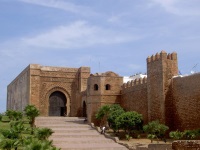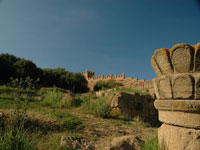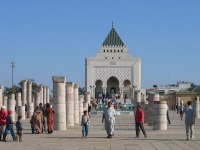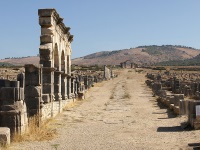Rabat Travel Guide
Blessed with charming palm-lined boulevards and well-maintained gardens, Morocco's capital, Rabat, is less thrilling than the frenetic alleys of Fez and Marrakech. It's no less steeped in history, though, as it was a haven for ruthless Barbary pirates who captured European trading ships in the 16th century.
Today, the King of Morocco lives in Rabat and it's the country's somewhat conservative administrative capital. Visitors, however, will find colour in the striking Medina (the old part of the city), and the Kasbah, where many of the chief tourist attractions can be found. Recreational opportunities abound by way of a world-renowned golf course (Royal Golf Dar Es Salam), a few lovely beaches, and some ancient ruins nearby.
Rabat's sister city, Sale, lies on the opposite side of the Atlantic coastal plain at the mouth of the river Bou Regreg, and is worthing visiting for its relaxing atmosphere. It's a quietly authentic destination of ancient religious monuments and brightly coloured fishing boats, where locals sip coffee at run-down cafes and bake flat bread in communal ovens.
Things to do in Rabat
Rabat's Medina, or old city, was created by Andalusian Muslim refugees from Badajoz in Spain, and was essentially all there was to the city until the arrival of the French in 1912 and the subsequent building of the Ville Nouvelle or new quarter. The Medina is small and not as interesting or attractive as the old city sections of Fez or Marrakech, but the foundouks (traditional cafes) and shops make for a lively atmosphere.
Souika Street is the main artery through the Medina, where visitors will find the leather sellers at the Sebbat souk (footwear bazaar). In Consules Street, shops sell curiosities, souvenirs, and Moroccan craft items such as copper and embroidery as well as the famed Rabat carpets. Another wonderful area to explore in Rabat is the Kasbah des Oudaias, with its famous white and blue buildings and lovely views.
Rabat is blessed with some captivating ancient ruins that will delight history buffs. The Citadel of Chellah was once a Roman port city and the remains of this centre are interspersed with the tombs of an Almohad necropolis. Another must-see is Volubilis, situated between Rabat and Fez, which was once a Roman city, and still holds some amazing ruins and mosaics.
There are also numerous popular excursions from the city, including the seaside town of Temara. It's a convenient eight miles away (13km) from Rabat, and is a favourite weekend picnic spot and campsite for city dwellers. The town has several pleasant stretches of sand, and some good hotels, restaurants, and nightclubs. The ancient city of Meknes is also within reach.

Kasbah des Oudaias
The Kasbah des Oudaias was added to UNESCO's list of World Heritage Sites in 2012, and is a pleasant place to take a stroll and admire some interesting architecture. The Kasbah was the Alhomad citadel of medieval Rabat, and is guarded by an impressive arched gate built around 1195. Inside the Kasbah is the palace and Andalusian gardens, as well as a broad terrace, which gives beautiful views of the river and sea close to the city's oldest mosque, the Kasbah Mosque, built in 1050. Below the terrace are several fortifications with gun emplacements guarding the estuary, and even further below lies a beach that is usually crowded with locals.

The Citadel of Chellah
Emerging from the boulevards of the Ville Nouvelle (New Town) of Rabat, travellers will come across the ruins of Chellah. Once the thriving walled Roman port city of Sala Colonia, it was abandoned in 1154 in favour of Sale across the river mouth. In the time of the Almohads the site was used as a royal burial ground and, following this, the Merenid sultan, Abou El Hassan, added some monuments and the striking main gate in the mid-14th century. Just inside the gate are Roman ruins dating from 200 BC, which include a forum, a temple and a craftsmen's quarter. The citadel is now part of a garden, and in spring the ruins are surrounded by a beautiful variety of flowers.

Hassan Tower
The massive Hassan Tower, which dates to 1196, is the minaret of a mosque and towers over the capital, Rabat. However, the huge Rabat Mosque itself was never completed and was largely destroyed in an earthquake in 1755. The mosque and the minaret were intended by the builders to be the largest in the world but today all that is left of the mosque are several walls in various states of ruin and 200 columns. Also, the minaret, made from striking red sandstone, is unusually situated at the centre of the mosque building, and was intended to be 262ft (80m) high, though it stands at 164ft (50m). Each façade of the minaret is intricately patterned with different motifs on each face.

Volubilis
Volubilis lies near the Moroccan town of Meknes and is situated between Rabat and Fez. Historically it was a central Roman administrative city in Africa from around the third century BC, and was built atop a previous Carthaginian city. Volubilis was unique in that it was not abandoned after the Romans lost North Africa to the Arabs, with even the Latin language living on in the area for several centuries. Volubilis remained inhabited until the 18th century, when it was demolished to provide building materials for the palaces of Moulay Ismail in nearby Meknes, which meant that a great deal of the Roman architectural heritage was lost. Today the ruins are a UNESCO World Heritage Site and consist of some well-preserved columns, a basilica, a triumphal arch and about 30 magnificent mosaics.
Getting Around
Rabat is a relatively small destination so getting around is fairly straightforward and journeys are never long. The easiest way to get around is by using the blue petit taxis, which are clearly visible throughout the city. Tourists are advised to ensure that the meters are used properly to avoid being overcharged. The Careem Taxi app is available as well.
Travelling by bus is a cheap and convenient way to get around, and provides a great opportunity to interact with local Moroccans. Buses in Rabat vary in quality and travellers should be aware of their belongings, as pickpockets are known to operate on busy services. A tramline runs between Rabat and its sister city, Sale. Trams run between about 6am and 11pm daily, and services operate roughly every 10 minutes during the week.
Those who prefer to explore Morocco's capital city at a more leisurely pace will find that most of Rabat's major attractions are accessible on foot. Car hire is available in the city, but foreigners are advised that driving can be stressful due to chaotic traffic, a general disregard for rules, and a high accident rate.
Rabat Climate and Weather
Located along the Atlantic coast of Morocco, Rabat has a temperate Mediterranean climate with mild winters and dry, hot summers. In winter, from late November to early March, average temperatures range from 48F (9C) to 66F (19C). Temperatures tend to drop quite drastically in the evenings and can be as low as 32F (0C) on winter nights, so it is always advisable to carry an extra layer of clothing. During the summer, from late June to September, temperatures average at about 77F (25C). The summer months are generally very dry, but during the winter Rabat does experience its fair share of sporadic thunderstorms. December is the wettest month, with an average rainfall of about three inches (76mm). As the city is located close to the sea, it experiences a light to moderate sea breeze throughout the year.
Morocco travel info
Electricity
The electrical current is 220 volts, 50Hz. Two-pin round plugs are in use.
Language
Arabic is the official language, but eight other languages are also spoken, including Berber, French and Spanish. English is generally understood in the tourist areas, but French is more widely used.
Money
The unit of currency is the Moroccan dirham (MAD), which is divided into 100 santimat. ATMs are available in the larger cities and towns, but can be unreliable; currency can be exchanged at banks or official bureaux de change, which are also widespread in major towns. Dirhams cannot be obtained or exchanged outside Morocco and receipts must be retained as proof of legal currency exchange, in addition to being the only way to re-exchange money when departing. Major credit cards are accepted in larger shops, hotels and restaurants.
Tipping
A tip of 10 to 15 percent is expected in the more expensive bars and restaurants, though some establishments do include a service charge. Most services are performed with the aim of getting a few dirham, but aggressive hustling shouldn't be rewarded.
Health
No vaccinations are required to enter Morocco, although travellers should consider vaccinations for hepatitis A, hepatitis B and typhoid. It is wise to only drink bottled water and to avoid eating uncooked meat. Rabies is present, so travellers should contact a doctor if bitten. Medical facilities are decent in all major cities but can be extremely limited in rural areas, meaning health insurance is recommended. All required medications should be taken along in their original packaging, and accompanied with a prescription from a doctor.
Safety
Travellers should watch out for petty crimes such as bag snatching, pickpocketing and scams, particularly on beaches and in medinas and market areas. Violent crime is not a major problem and most visits are trouble-free, though there have been some incidents of theft at knife point in major cities and on beaches. Sensible precautions such as avoiding badly lit streets at night should be adhered to.
Guides offering their services should display an official badge from the local tourist authorities. Touts and merchants can get quite pushy and confrontational so visitors should be firm but polite when refusing goods or services.
Female travellers may attract unwanted attention from Moroccan men, and should take advice before deciding to travel to the country on their own. Travellers should avoid the Berm (border regions of Western Sahara), Western Sahara, as well as the borders with Algeria and Mauritania for reasons such as the risk of kidnapping and the presence of unexploded landmines.
Local customs
Morocco is a Muslim country and it is best to keep the wearing of swimsuits, shorts and other revealing clothing to the beach or hotel poolside. Women travelling alone will generally be hassled less if dressed conservatively. The country has many smokers, and it is customary to offer cigarettes in social situations. Religious customs should be respected, particularly during the month of Ramadan, when eating, drinking and smoking during daylight hours should be discreet as it is forbidden by the Muslim culture. The giving and receiving of things, and the eating of food, should only be done with the right hand, as the left is considered unclean. Homosexuality is a criminal offence, and sexual relations outside marriage are also punishable by law.
Doing business
Business in Morocco has been influenced by France so it tends to be conducted formally, with an emphasis on politeness. Dress is formal, and women in particular should dress conservatively. Most business communication takes place in French, though some English is spoken. It is best to ascertain beforehand what language the meeting will be in, and to arrange an interpreter as needed. Visitors are expected to be punctual but meetings may not start on time. Moroccans are friendly and enjoy socialising; trust and friendship are an important part of business dealings so foreigners should be prepared to engage in small talk. A handshake is common when arriving and departing. Women may encounter some sexism in business, though this is starting to change. Most businesses are closed on Fridays, and some are also closed on Thursdays.
Duty free
Travellers to Morocco over 18 years do not have to pay duty on 200 cigarettes or 50 cigars or 400g tobacco; 1 litre spirits and 1 litre wine; and 150 ml of perfume and 250 ml of eau de toilette.
Communications
The international access code for Morocco is +212. The outgoing code is 00 followed by the relevant country code (e.g. 0044 for the United Kingdom). Hotels can add a hefty surcharge to their telephone bills so it is best to check before making long international calls. Public WiFi is readily available in most major cities; visitors should purchase a local SIM on arrival or use eSIMs if their cellular providers support it on their networks.
Passport & Visa
Generally, travel to Morocco does not require a prior visa application; however, travellers should enquire about the specifics from their nearest Moroccan embassy. Also, all foreign passengers to Morocco must hold proof of sufficient funds to cover their expenses while in the country. It is highly recommended that travellers' passport have at least six months' validity remaining after the intended date of departure from their travel destination. Immigration officials often apply different rules to those stated by travel agents and official sources.
Entry requirements
US citizens must have a passport that is valid for at least six months at the time of entry. No visa is required for stays of up to 90 days.
UK citizens must have a passport that is valid for at least three months on their date of entry. No visa is required for stays of up to 90 days.
Canadian citizens must have a passport that is valid for at least six months beyond the date of departure. No visa is required for stays of up to 90 days.
Australian citizens must have a passport that is valid for at least six months beyond the date of departure. No visa is required for stays of up to 90 days.
South African citizens must have a passport that is valid for at least six months beyond the date of departure. A visa is required.
Irish citizens must have a passport that is valid for at least six months beyond the date of departure. No visa is required for stays of up to 90 days.
New Zealand citizens must have a passport that is valid for at least six months beyond the date of departure. No visa is required for stays of up to 90 days.
Useful contacts
Moroccan National Tourist Office, Rabat: www.visitmorocco.com.
190 (police and medical emergencies)Embassies / consulates in other countries
Moroccan Embassy, Washington DC, United States: +1 202 462 7979.
Moroccan Embassy, London, United Kingdom: +44 20 7724 0624.
Moroccan Embassy, Ottawa, Canada: +1 613 236 7391.
Moroccan Embassy, Canberra, Australia: +61 2 6290 0755.
Moroccan Embassy, Pretoria, South Africa: +27 12 343 0230.
Moroccan Embassy, Dublin, Ireland: +353 1 660 9449.
Embassies / consulates in Morocco
United States Embassy, Rabat: +212 0537 637 200.
British Embassy, Rabat: +212 537 63 3333.
Canadian Embassy, Rabat (also responsible for Australia): +212 537 54 49 49.
South African Embassy, Rabat: +212 537 70 0874.
Irish Consulate, Casablanca: +212 522 27 27 21.
New Zealand Embassy, Cairo, Egypt: +202-2461-6000.



